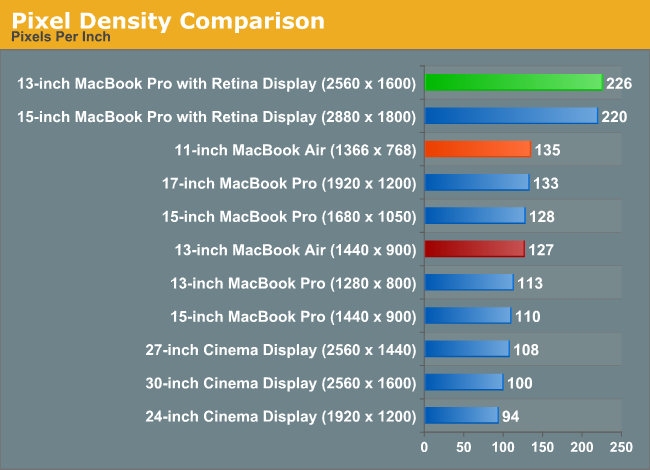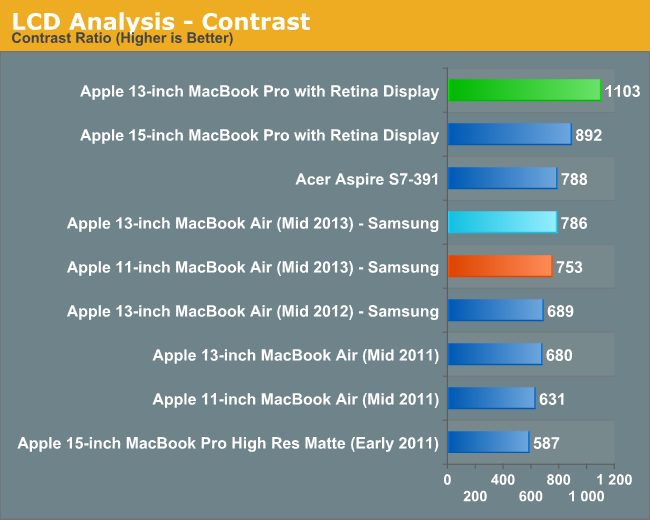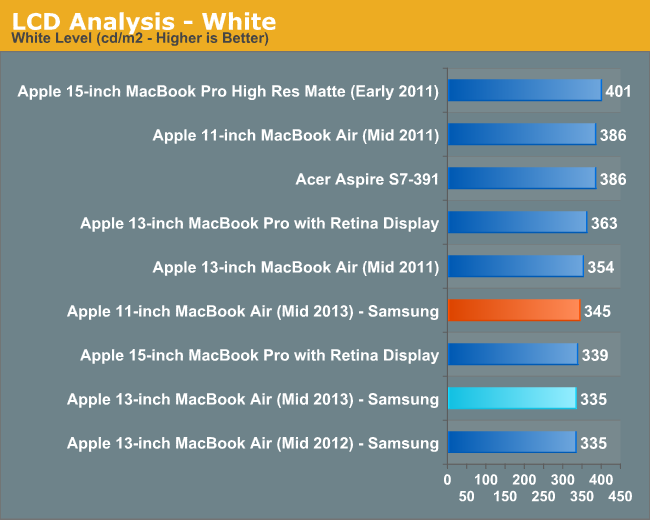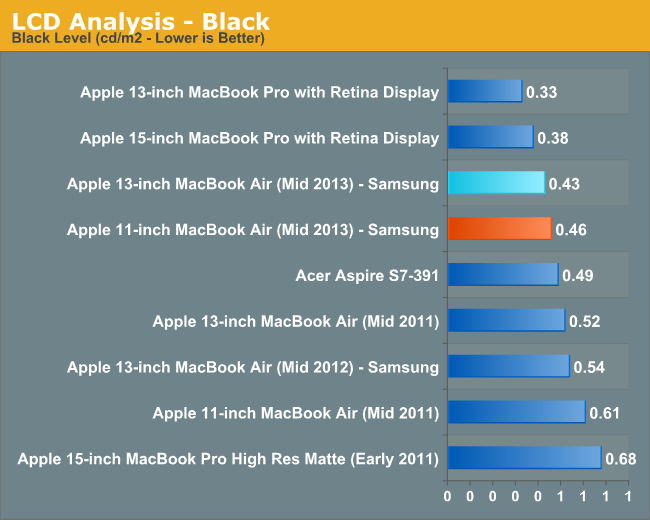The 2013 MacBook Air Review (11-inch)
by Vivek Gowri on August 9, 2013 1:45 AM ESTThe 11.6” Samsung display panel in my Air evaluation unit is actually the same one I had on my last MacBook Air, though the one before that had an LG panel. This is all based on the panel supply lottery, and while it’s been alleged that the Samsung is a superior quality panel in terms of contrast and viewing angles, I honestly can’t say there’s too much of a difference overall between the two. I’ve never had them side-by-side, and color calibration can certainly skew visual perception significantly, so let’s just say that your mileage may vary. If you don’t like the panel you get, take it back and try another one—Apple Stores seem to cater to discerning customers (or they have with me).
 Obviously, given our familiarity with the Air 11”, there’s nothing surprising here with the 2013 edition. It’s roughly the same as the last few we’ve had, beyond standard panel to panel variations. Contrast ratio and color reproduction are pretty decent, as they were before, and viewing angles are solid by the standards of TN panels. This is still the best 11.6” TN panel I think I’ve come across, but it’s been eclipsed many times over by the 1080p IPS 11.6” panels that are shipping in basically any higher-end 11.6” Ultrabook these days.
Obviously, given our familiarity with the Air 11”, there’s nothing surprising here with the 2013 edition. It’s roughly the same as the last few we’ve had, beyond standard panel to panel variations. Contrast ratio and color reproduction are pretty decent, as they were before, and viewing angles are solid by the standards of TN panels. This is still the best 11.6” TN panel I think I’ve come across, but it’s been eclipsed many times over by the 1080p IPS 11.6” panels that are shipping in basically any higher-end 11.6” Ultrabook these days.


 This is probably the biggest issue that I have with the 11” Air. The 11.6” 1366x768 TN panel was industry standard when the first Air 11” hit the market, and the panel quality was actually pretty decent. The display size, pixel density, and aspect ratio each specifically aren’t bad on their own, but the combination results in a pretty unsatisfying viewing experience in this day and age. I’ve never liked the 1366x768 resolution for notebook displays, regardless of panel size; the lack of vertical pixels just kills it for me. Even 1280x800 in the 13” MacBook Pro (non-Retina) is better. I don’t mind 16:9 as an aspect ratio, even at this size, but I just want more pixels. That’s really the biggest part of what makes the 13” so much more usable, the 1440x900 display in that also won’t blow you away in terms of dot pitch or even visually when compared to the Retina MacBook Pro or a modern Ultrabook, but it offers a much more pleasant experience than this 11.6” panel.
This is probably the biggest issue that I have with the 11” Air. The 11.6” 1366x768 TN panel was industry standard when the first Air 11” hit the market, and the panel quality was actually pretty decent. The display size, pixel density, and aspect ratio each specifically aren’t bad on their own, but the combination results in a pretty unsatisfying viewing experience in this day and age. I’ve never liked the 1366x768 resolution for notebook displays, regardless of panel size; the lack of vertical pixels just kills it for me. Even 1280x800 in the 13” MacBook Pro (non-Retina) is better. I don’t mind 16:9 as an aspect ratio, even at this size, but I just want more pixels. That’s really the biggest part of what makes the 13” so much more usable, the 1440x900 display in that also won’t blow you away in terms of dot pitch or even visually when compared to the Retina MacBook Pro or a modern Ultrabook, but it offers a much more pleasant experience than this 11.6” panel.










139 Comments
View All Comments
Torrijos - Friday, August 9, 2013 - link
One has to wonder how much more battery life improvements OS X Mavericks will bring, seeing how Apple made most of their selling points about energy efficiency.xTRICKYxx - Friday, August 9, 2013 - link
I've been using Mavericks for a while and I haven't noticed anything too drastic. I typically get around 7-8 hours of light workload for my 15". At most maybe a 10% increase.But this is not including the fact that most of my 3rd party apps do not include App Nap yet. It could make a difference.
ctrocks - Friday, August 9, 2013 - link
I still want to know the fascination with 11 inch notebooks. I am 6'3" (1.9m) tall, with relatively large hands, and am 47 with good vision for my age (no glasses needed yet). 13 inch notebooks seem small to me, let alone 11. My hands can't fit comfortably on keyboard to touch type.I understand portability, but I just can't see using such a small device except for cases where extreme portability is an absolute necessity. I would prefer a 15 inch screen, and a bigger keyboard that fits me over portability.
abazigal - Friday, August 9, 2013 - link
You just answered your own question. Ultra-portability. 15-inch laptops are great to use, but absolute murder to haul around when it's time to pack up and leave.ananduser - Friday, August 9, 2013 - link
Since you talked about the new Sony Vaio, how about, you know, actually reviewing one(the Pros or the Duo or both). You(Anandtech not Vivek) have reviewed 3 MBAs already and not a single other ultraportable.BTW corners have been cut in order to achieve the MBA's battery life, the low res screen and the relatively slower CPU. Why not mention it so as to compare apples to apples(no pun intended)?
fokka - Friday, August 9, 2013 - link
though i'm not a big fan of the mba, i still think that it is a valid choice for someone seeking portability and not dependent on a ton of processing performance, even more now the battery life has improved to a level you don't really have to think about it much anymore on a day to day basis.sure, the display is a bit of a bummer, but only because we became so spoiled by tablets and high-DPI laptops in the recent years. still, it won't hinder you doing any of your work.
what i like about the air and essentially the entire macbook line-up, is that they are no-nonsense solutions. you get a great package of high quality case, great input devices, above average display quality and most important usable battery life on a mobile device.
just compare it with the vaio pro. i love some of the vaio lineup for their performance, features and portability, but no way in hell i'm going to shell out this much for a plasticy-feeling computer, no matter if they call the material carbon fiber, magnesium, or whatever they come up with.
still, using a 2010 mbp13 right now, i'm not really thinking of investing in apple gear again very soon since i learned to prefer a more native windows environment. this is where asus zenbook line comes into play and i hope they can make similar progress with the haswell upgrade as apple, all while providing a great 1080p display.
ESC2000 - Saturday, August 10, 2013 - link
So a plastic feel would stop you from an otherwise superior product? Thus is the same tired old argument always trotted out by Apple fans. They used it when the S4 came out with features that demolished the iphone 5. They've probably used it for every Samsung phone that has been released with that prole plastic.It is your business how you spend your money, but I but devices to perform tasks for me. If a physical feature is relevant to function (eg the air's unnecessarily large bezels take up precious screen real estate) then I care. But if the best device for me comes in plastic I don't care unless plastic will disrupt its functioning. I don't care whether other people think my device looks expensive. I don't care whether it feels 'plasticky' when I touch it. What is so terrible about plastic anyway?
I know this is a tired old argument. I should probably save this post in keep so I can just copy paste it every time someone tries to say metal is more premium. Apple did do a good marketing job on that one though.
fokka - Saturday, August 10, 2013 - link
i wouldn't even go so far as to call myself an apple fan, since the macbook is the only apple product i ever owned and i'm not having plans on upping that count in the future, but still, i can appreciate certain aspects, like the build quality, of their line up.see, in the end it's just personal preference. i for one wouldn't be happy with a "superior" machine hardware wise, if it feel plasticy and flimsy. and please don't tell me a VAIO lid doesn't feel flimsy. i can't comment specifically on the VAIO pro, but about every sony ultraportable i ever touched had a crazy thin display lid which twisted by mere looking at it, so i feel safe extrapolating from that.
if you are happy with a polycarbonate build that's great and i don't even mean this sarcastically, but for me, i want a device i use for hours to feel great and sturdy and i find this is more the case with a good metal build.
geok1ng - Friday, August 9, 2013 - link
U$1000 for a 768p TN panel. I do agree with the review: lets wait for the Surface Pro with Haswelll parts. Or get a real high end ultraportable with a real high end display, for the same price apple is asking for this airthingieabazigal - Friday, August 9, 2013 - link
Higher screen res typically comes at the expense of poorer battery life. Apple simply made a judgement call to prioritize battery life over everything else. I don't see that as an inherently bad thing.